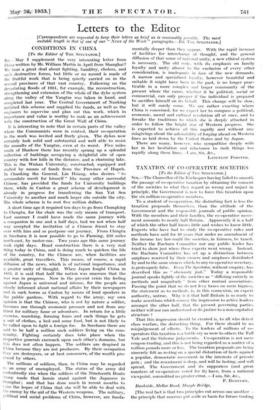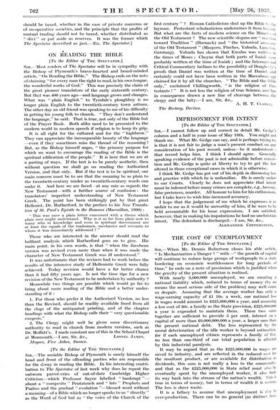TAXATION OF CO-OPERATIVE SOCIETIES
[To the Editor of THE SPECTATOR.] SIR,-The Chancellor of the Exchequer having failed to smooth the passage of co-operative taxation by obtaining the consent of the societies to what they regard as wrong and unjust in principle, the Government is now to force this taxation upon the six million co-operative members.
To a student of co-operation, the disturbing fact is less the taxation proposals themselves, than the attitude of the Government and the responsible journals of public opinion. With the members and their families, the co-operative move- ment amounts to nearly half Britain. Apparently it is a half of which the other half knows little and wishes to know little. Experts who have had to study the co-operative rules and methods have said for 44) years that under no amendment of the income tax law could the societies, in fairness, be taxed. Neither the Raeburn Committee nor. any public leader has tried to show just where these experts went wrong. Instead, the Raeburn Committee has set up a distinction between surpluses reserved by their owners and surpluses distributed by and to the same owners which, to any co-operative secretary, is grotesquely false. Even The Spectator, without enquiry, has described this as " obviously just." Today a responsible journal speaks lightly of the societies as " differing entirely in methods and magnitude " from other mutual associations.
Passing the point that we do not levy taxes on mere bigness,. the statement as to methods, is, in this connexion, on expert authority, untrue. Why is it that half Britain is so ready to make assertions which convey the impression to active leaders amongst the other half, that the present governing parties neither will nor can understand or do justice to a non-capitalist structure That this impression should be created is, to all who detest class warfare, the disturbing thing. For there should be no misjudgement of effects. To the leaders of millions of co- operators this taxation is a battle cry as were to others the Taff Vale and the Osborne judgements. Co-operation is not mere coupon-trading, and this is not being regarded as a matter of a million pounds more or less. The taxation propoials are being sincerely felt as resting on a special distortion of facts against a popular, democratic movement in the interests of private gain ; and the resentment is deep, and will be lasting, and will spread. The Government and its supporters (and great numbers of co-operators voted for it) have, from a national viewpoint, committed no greater error. —I am, Sir, &c., Bankside, Mellor Road, Marple Bridge.
P. REDFERN.
[The real fact is that two principles cut across one another the principle that reserves put aside as basis for future trading
should be taxed, whether in the case of private concerns or of co-operative societies, and the principle that the profits of mutual trading should not be taxed, whether distributed as " divi " or put aside as reserves. It was the former which The Spectator described as just.—En. The Spectator.]

















































 Previous page
Previous page